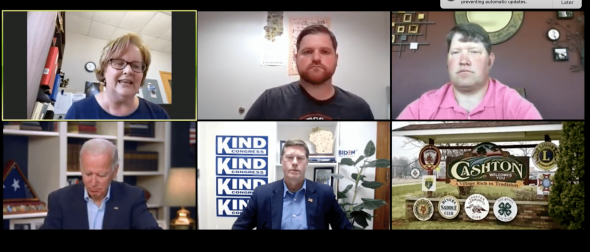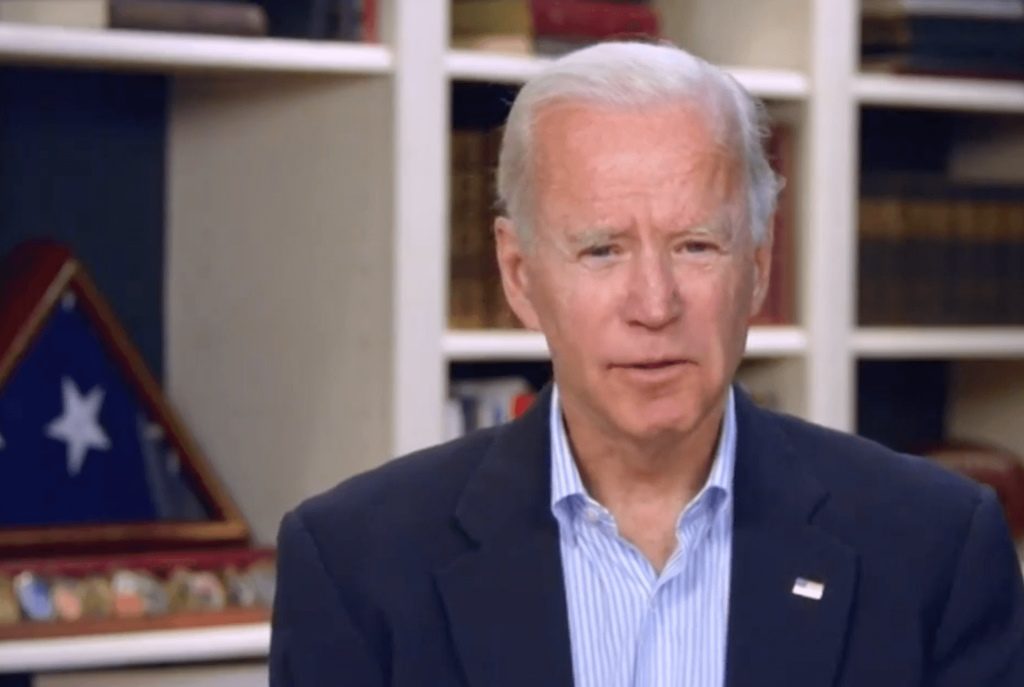Biden Virtually Campaigning in Rural Wisconsin
The former Vice President held a virtual round-table on rural issues with Rep. Ron Kind of Lacrosse.
Winning Wisconsin will be critical in the 2020 presidential election. But the coronavirus pandemic has put the kibosh on political rallies and door-to-door campaigning.
So on Wednesday, presumptive Democratic nominee Joe Biden appeared from home at a virtual “rural issues roundtable” hosted by Rep. Ron Kind (D-La Crosse) to talk about the concerns of a crucial swing demographic in our crucial swing state.
Joining Biden on the call were Mari Freiburg, CEO of Scenic Bluffs Community Health Centers, Rob Grover, economic and tourism coordinator for Trempealeau County, and Darin Von Ruden, president of the Wisconsin Farmers Union.
Biden praised Kind and the panel members for being people whose judgement “comes from their gut” instead of their heads — an odd opener for the candidate running against gut-driven President Donald Trump.

Freiburg, Grover and Von Ruden (top) with Joe Biden and Ron Kind during the rural roundtable. (Screenshot)
“I come from a rural state,” Biden told the group. Midwesterners might think of Delaware as an “Eastern state that is very congested,” he said, but, “the truth of the matter is our largest city in the state is a little over 150,000 people. And our next largest is 22,000. And we’re an agricultural state … soy beans, mainly, and also chickens.”
Nodding to the grim statistics that rank Wisconsin number-one among the states for farm bankruptcies, Biden said, “We can’t ignore the crisis that was already taking shape in rural America before the virus hit.”
“How many farmers would be in a better spot if their profits hadn’t vanished, because Trump goaded our trading partners into placing brutal tariffs on American cheese?” he said.
Promoting his “rural economic opportunity agenda” Biden talked about his plan to support bio-fuels, as well as a $20 billion investment in rural broadband. He touted Sen. Tammy Baldwin’s bill to help stabilize rural economies by shoring up food supply chains disrupted by this pandemic.
“There’s a whole lot more in my plan and others, but here’s the principle that underlies it all,” Biden said, “rural communities power our nation. They feed our bodies. They fuel our engines. They’re the stewards that protect our lands, and we cannot sustain an economy that exacts value from them without ever sharing in the rewards.”
From her rural health center in Cashton, Freiburg described the struggle to get testing supplies to combat COVID-19. And, she added, “with this godawful economic downturn that we’ve hit — this recession that’s moving into the potential of a depression — we have a lot more people who have who have lost employer-based health insurance coverage.”
From Trempealeau County, Grover talked about the restaurants, bars, salons and other small businesses that have had to close in his area, and their difficulties getting help through the federal small-business loan program.
“I think where a lot of anger has come with some of the federal response to this — especially in rural Wisconsin,” Grover said, “is that it seemed really easy for large corporations, you know, million-, billion-dollar companies, to get this funding really quickly. They’ve got teams of lawyers; they’ve got teams of lobbyists; they’ve got connections to people in power. But when it comes to small businesses that were relying on that money, they couldn’t get access to it when they needed it.”
After the state Supreme Court overturned Wisconsin’s Safer at Home order, Grover added, “every business wants to get people back in and, you know, enjoy their business, but they’re really worried about doing it safely.”
“Wall Street is getting too much,” he added. “Wall Street didn’t build America. I’ve been saying this for 35 years.”
He contrasted the current administration’s oversight of small-business recovery funds with the Obama administration’s stewardship of recovery money after the 2008 financial crisis.
“As President, I’m going to make sure that I will do this the right way,” he said, promising to reserve half of new payroll protection funds for businesses with fewer than 50 employees, and greater oversight.
Von Ruden, of the Farmers Union, spoke last, thanking Biden and Kind for the opportunity to share the perspective of farmers, and posing the question, “How do we get to a system where farmers have more control over their own destiny?”
This, he said, is the most important issue that the Wisconsin Farmers Union has been working on over the last three years. The answer they have come up with, he added, is a growth- management program,
“Why are we producing and continuing to overproduce all commodities — not just milk, but corn, soybeans, fruits and vegetables?” Von Ruden asked. “You know, we’re seeing, because of the coronavirus now, issues of having to just dump milk, euthanize hogs and chickens and pigs, simply because we don’t have the slaughtering capacity to deal with it, because the workers in the plants are sick.”
“It’s just frustrating as a farmer to have to see, you know, my fellow farmers destroying animals and destroying crops and because of the system that we currently have,” he added.
Von Ruden agreed with Biden that Trump’s trade wars hurt farmers, but he went further, reminding him that during the Obama administration there was a task force that looked into monopolies and antitrust issues.
“That’s a big impact in agriculture and in … all industries, when we have fewer and fewer players controlling what’s going on.”
Biden agreed with the idea that monopolies are a problem, but didn’t dig deeper into Von Ruden’s specific policy suggestions, sticking to the broader themes, and spooning on some extra praise for farmers.
“The idea of us going to just one, big agribusiness notion — I think it’s a gigantic mistake,” Biden replied. “It lacks flexibility. It keeps people out of the system.”
“This country is now being reminded that food just doesn’t magically appear on our plates,” he added. “It starts with American farmers and because of your ingenuity and hard work we’ve long been able to feed the nation and most of the world.”
Biden also made some specific policy suggestions to address the crisis created by the pandemic.
“If I were president today, here’s what I’d be doing,” he offered, “I would have the federal government … purchasing milk from dairy farmers that lost their big purchasers like restaurants and schools.”
Wrapping up, Biden covered some familiar territory, mentioning the lessons his dad taught him about the dignity of work, and expressing his dismay that in the current economy, “so many people are being deprived of their dignity.”
Then he asked the panelists to stay in touch.
One observer, retired Wisconsin dairy farmer Jim Goodman (who has written for the Examiner) gave Biden’s rural outreach effort mixed reviews. He liked Biden’s nod at the idea that farmers deserve fair prices and his mention of infrastructure supports including rural broadband. On monopolies, big business and Wall Street he was more skeptical. “He told Wall Street if he’s elected nothing will change,” Goodman noted. As for the monopoly task force Von Ruden mentioned, “those hearings were held in 2010, he was VP, and absolutely nothing came from it.”
As for the financial crisis, afterwards “the banks came out bigger than before and there was more consolidation in agriculture, not less.”
Goodman noticed that Biden ignored Von Ruden’s mention of production management, which, he says, “is needed if small farms are to survive and for new farmers to be able to get into farming — they need to know they can make a living.”
“It would have been nice if at some point he would have noted that all the corn and soy we produce is not really food,” Goodman added. “We need more small farmers growing vegetables, pasture base livestock and more small local processing plants.”
Instead of tinkering with international trade and commodity prices, Goodman, like the Wisconsin Farmers Union, wants to see more emphasis on local food economies.
Biden wrapped up the session by expressing his obvious frustration at being confined at home, and describing what he would be doing if he were out on the campaign trail. “I’d be visiting a hospital to begin with. I’d be visiting your health services facility to begin with. I’d be talking to you. And I’d be with you and talking about the Farmers Union — what the problems are.”
“And so this is the way to, in the midst of this crisis, to be able to keep me informed,” he added. “So that I hear directly from all of you.”
Reprinted with permission of Wisconsin Examiner.






















